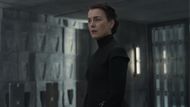Dune: Prophecy features several parts of Frank Herbert’s Dune universe that have not been explored in depth in the film adaptations. One of them is the High Council, seen in the fourth episode of the show, Twice Born.
The HBO series is set 10,000 years before the events of the Denis Villeneuve directorial Dune movies and is canon to the novels. It follows the Sisterhood and chronicles the establishment of the Bene Gesserit order.
In Twice Born, the sisters want Harrow to be placed on the High Council following the death of its member Richeses. The High Council in Dune: Prophecy is a governing group within the Landsraad, a political organization.
The High Council is the inner governing body of the Landsraad

The High Council is the inner governing body within the Landsraad, a powerful political institution in Frank Herbert's Dune books. First seen in Dune: Prophecy episode 4, the High Council acts as the top authority for solving disputes between noble Houses in the Imperium.
This inner circle plays a major role during the era of the Faufreluches, a strict class-based system. In the books, the council handles complaints brought by noble houses through a formal process called a ‘Bill of Particulars,’ which outlines the details of the issue.
It is the sole body with the authority to question the decisions of the Judge of the Change, but only in the presence of the Emperor. Hence, the High Council becomes necessary for keeping a balance of power in the Imperium.
Even though the council’s influence decreases over time, the High Council still exists in Denis Villeneuve's Dune movies. After the Harkonnen invasion of Arrakis and the murder of Duke Leto Atreides, Paul Atreides considers bringing a complaint to the High Council.
He hopes the council will stand against the Sardaukar’s involvement, which threatens all the Houses. This shows that the council remains a prominent organization for controlling unchecked power in the Imperium even 10,000 years later.
The High Council’s role in Dune: Prophecy

In the Dune: Prophecy episode Twice Born, the High Council becomes a central setting amid the growing conflict between Valya Harkonnen, Desmond Hart, and the Emperor. Valya tries to use the council to restore her family’s reputation.
She plans to secure a seat for Harrow Harkonnen in the council and start an investigation into the death of Pruwet Richese while blaming the Emperor. However, her plan falls apart when Desmond exposes rebels and illegal tech traders in the council chambers with the help of Empress Natalya.
Desmond kills them in front of everyone with his mind-burning abilities. The act further strengthens the Emperor’s rule as it instills fear among the people, and Valya’s scheme fails.
Despite her failure, Valya gains an advantage as she is able to retrieve a blood sample from Desmond. With the blood, she hopes to uncover the secret about his abilities that could shift the power in the realm.
At the same time, Desmond makes sure dissenting Houses fall in line and further tightens his grip on the galaxy’s politics. Hence, the High Council becomes more than just a meeting place for settling disputes in Dune: Prophecy. It becomes a place where alliances are formed and broken and a power shift occurs.
Dune: Prophecy stars Emily Watson, Olivia Williams, Travis Fimmel, Jodhi May, Sarah-Sofie Boussnina, Chris Mason, Mark Strong, Chloe Lea, Shalom Brune-Franklin, Jade Anouka, Josh Heuston, Edward Davis, and Aoife Hinds in the main roles.
The series airs on HBO on Sundays.
